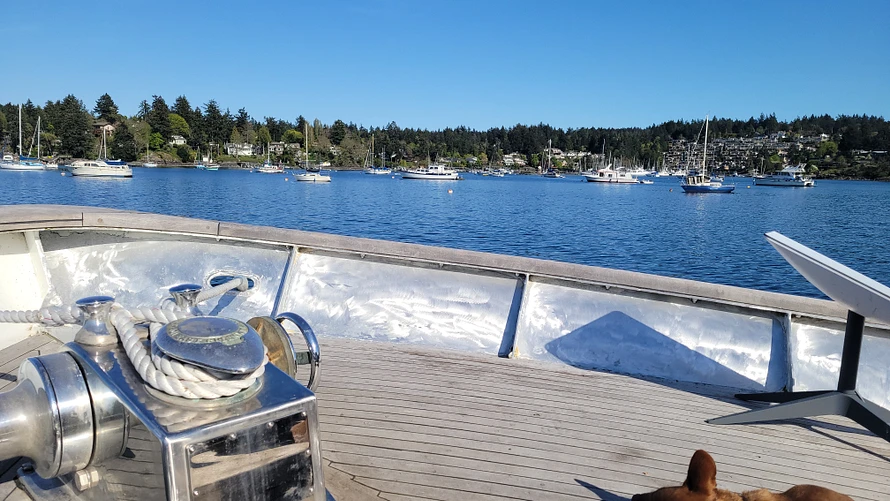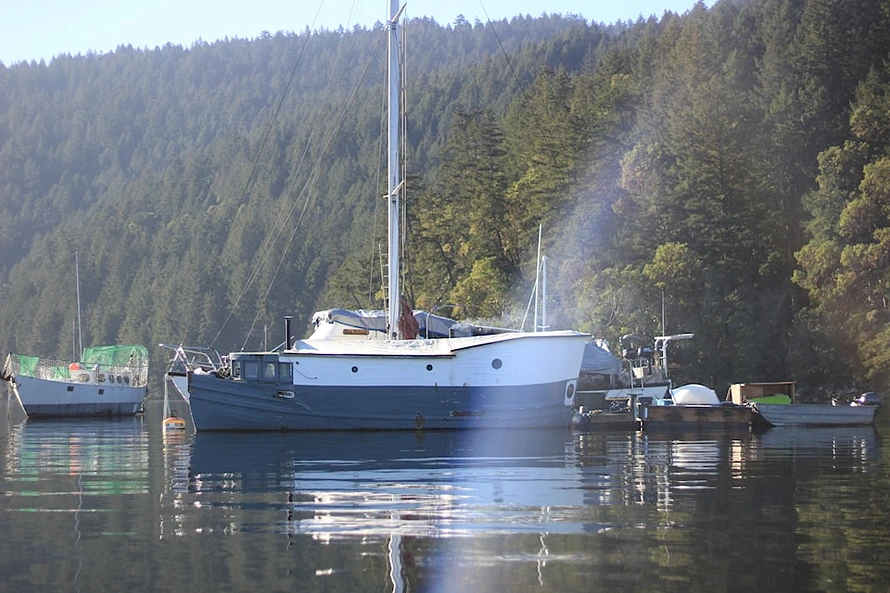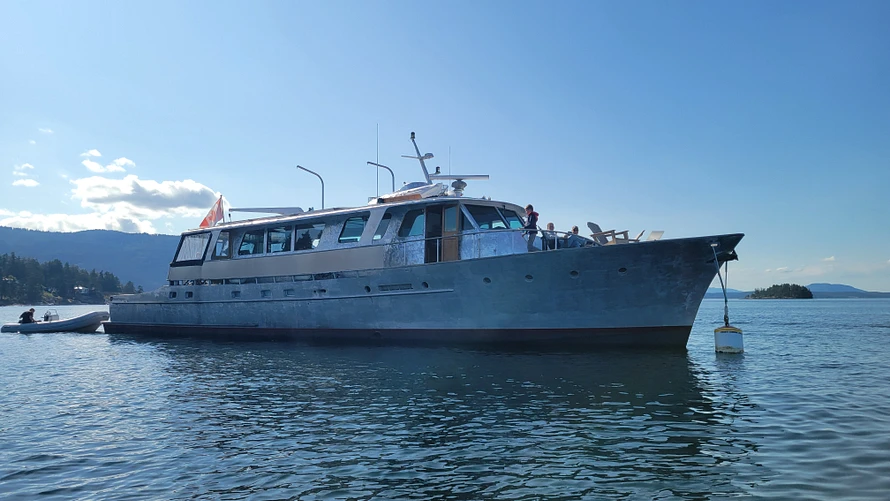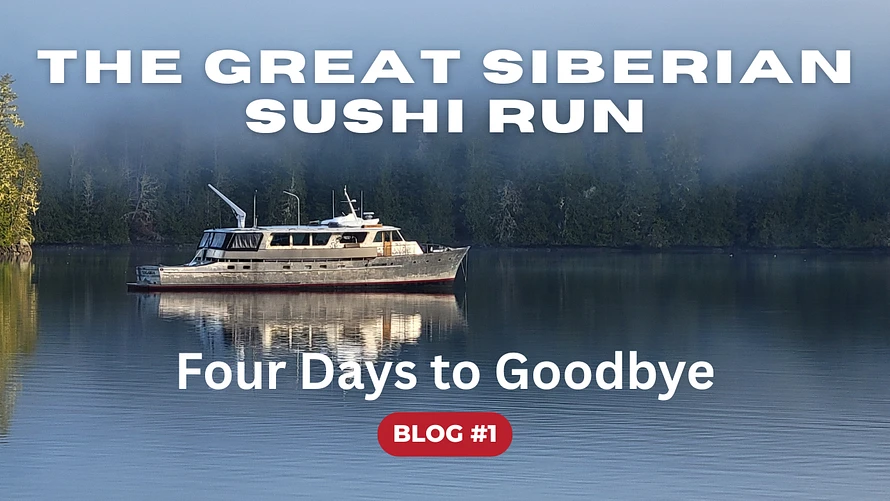My knees ache. It actually feels like someone took a razor blade to both of them and cut them up, which is basically what happened.
We’re in the final preparations before we leave for the Great Siberian Sushi Run. As I sit here in the hammock early in the morning, looking out at the bay we’ve called home for five years, I’ve got a hot cup of tea in my hand and the hammock gently swinging. I look at my neighbors and all the boats around us.

A moorage is a funny place.
It’s like any street—except you can almost see into everybody’s home. You can hear them, see what they’re up to. It can be extremely nosy, to tell you the truth.
I’m listening to the gentleman over on our starboard side who must be having a bad morning, because the F-bomb is flying around.
A dinghy passes off our stern, putting along with a dog in it. It’s early, so the dog must have just gone to shore for a bathroom break.
I look behind me and realize that some folks aren’t even up yet. On the port side is what I call Tod Town—a collection of people living on their boats who, if they didn’t have their boats, would probably be on the street. They’re starting their morning work because these people take extreme pride in what they’ve built as their own little kingdoms.
That’s what I call them.

It’s kind of like when you see a homeless person walking down the street with a shopping cart full of their belongings. This is the same thing—except it’s a boat full of goods. It’s their home, their little place on earth they’ve carved out to live a quiet lifestyle. Sometimes not so quiet, because it’s also the place where the police probably spend the most time.
Then there are the paddle boarders.
The wind is just starting to pick up. Everything’s been glass calm, and you can hear them talking, having their morning conversations as they paddle around, enjoying this Canada Day.
And then there’s me.
Sitting here looking at my boat, realizing that in four days, we’re having our Bon Voyage open house.

Our boat was dirty. Izzy and I spent the whole afternoon yesterday scrubbing on our hands and knees up on the top deck, trying to remove the diesel soot from our winter heat. It looks pretty good right now, but I know after next winter, it’ll be all black and sooty again.
My hands are sore, my knees are sore, and I’ve got that sting from a little too much sun on my back. But that’s okay, because looking at the job this morning, as I swing here on my hammock, it looks pretty damn good.
Then I think about the Great Siberian Sushi Run.
Blaine is downstairs answering YouTube comments, which we get quite a lot of. Sometimes they’re bad. But you know what? We just delete those because they’re not needed. We don’t need to speak with people who believe they’re anonymous behind a keyboard. Instead, we answer the positive ones, the questions, the ones that remind us why we’re doing this. We try to be accessible to the people who watch our channel. Let’s just say that.
So in four days, we open up our boat for a Bon Voyage party. But there’s so much to do. I’ve broken up the cleaning because she’s 78 feet, and me being 53 years old, I’m just not capable of doing the whole boat in one day anymore. So again, Izzy and I did the top deck—Izzy, our 18-year-old daughter who just graduated Stelly’s High School. She’s coming with us, which is amazing.
This afternoon, we’ll tackle the bow back to the doors behind the breezeways. Tomorrow, we’ll do the aft decks—there are two of them.
Last night, Josh, our 22-year-old son, came onboard. He’s been living on shore for about three years now, in our house. I already had my cry about him about a week ago, because I’ve never left him. I consider him one of my best friends. That’s the relationship we have.
After dinner, I didn’t take him to shore. I gave him a huge hug, told him I loved him. He kissed me on the forehead, which is kind of his thing. He’s leaving early because he’s heading down to Los Angeles to see his online friends.
I could feel it, as they were driving off in the dinghy—Blaine and him in Punga—my throat starting to ache, starting to close up, the tears starting to come.
But after 20 years of policing, I’ve been taught to hide those emotions. So that’s what I did. I pushed them down. I took them and put them into my shoebox on the shelf. And I know, sometime in the future, that box is going to fall off, and I’m going to question whether leaving on Tangaroa was the right thing.
Kids are a funny thing. We raise them to live life on their own, but for us, we can’t imagine life without them.
It’s an oxymoron, isn’t it?
Anyway, Blaine came back after dropping him off, and he said he’d had a bit of a cry on the way back. And I think that’s what I love about Blaine—he can admit his emotions, admit that it was hard saying goodbye to his son.
So that’s what I’m doing this morning.
Sitting here, thinking that it’s Canada Day, but we’re choosing to head north and leave Canada—our home for, what, 53 years? And wondering, with the world the way it is right now, whether we’re making the right choice.
But for us, the sense of freedom and living life on our own terms—that’s what we’re searching for.
